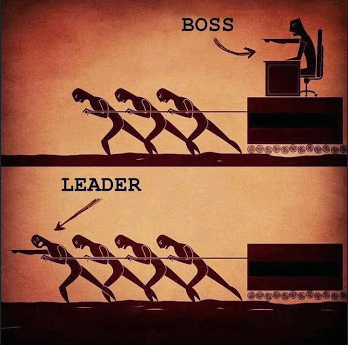By Benjamin Underwood
I have been a manager for most of the last two decades. I use the term manager, even though it is no longer very popular. Many are now teaching the more appropriate terminology is leader or coach. The shift being driven by the idea that one manages things not people. Personally and in my own experience I do not agree with it. I know the most important thing in managing is not the title, but the mindset. The person who takes up the role of manger, leader, or coach must do so with a mindset of service instead of authority.
Photo courtesy of Flickr
Managers must exercise certain ideals and have a modicum of authority to be enabled to carry out their duties on any given day. That being said, the idea of managing just for the feeling of superiority that some derive from the position is a self-defeating cycle. People who manage as a servant understand that their role is intended to be a connection between internal and external customers. The internal customer is the associate who reports to them, the employee. The external customer, the client or guest, is the one who introduces the outside need and the all important payments for goods or services.
While the needs of the internal vs external customer vary greatly, they both need a dedicated and resourceful manager in place. The successful manager is not only a key component of profitable and successful business ventures, but also must be instrumental in customer and employee relations. The employee needs to trust their managers, and have faith in their honesty and ability. The customer needs to know that there is someone in place to hold the business and it's employees accountable to the highest standards. Managers who abuse employees will find themselves working alone or understaffed, and will feel the stress of their own making. Managers who neglect the customer will find that their employees will do the same and the results of the business will not live up to even the lowest standards or expectations.
Employees see managers in various ways, often in ways the manager would be surprised to hear. Managers who do not follow through with their commitments are seen as unreliable. Those who do not administer the standards evenly and consistently across all employees, are seen as playing favorites and unfair. When a manager does not lead by example, they can be seen as incompetent. Employees could and should expect the managers they work under to exemplary in everything they do. The manager who doesn't know everything is acceptable, as long as they are honest about it. It is okay to not have knowledge of everything, but the manager should know where to get the answers. The employee should know without a doubt that the manager will hold a firm line between acceptable and unacceptable. This is not only important when measuring and evaluation of the employee, but when dealing with the customer who may verbally attack the employee. The manager needs to place the mental, emotional, and physical safety of their employee above all else.
Customers come to businesses in search of goods and services, delivered in a way that will meet or exceed the standards of other establishments. They will often shop around with that very ideal in mind, that achievable standard of a place where policies and practices deliver on the unspoken promise. Customers have been lied to and now believe the idiom, “Customers are always right,” this lie is the bane of every manager. The truth is much simpler, the customer is always the customer, right or wrong. The manager who can get past the idea of needing to be right, is the manager who is best suited to deal with difficult and rude customers. Many customers will cross lines in many ways that will push any employee to their limit. The successful manager will have tough enough skin to handle the attacks, and sense enough to step in quickly when under-prepared employees might loose their tempers. Being prepared to deal with customers who are arrogant and ignorant is not a option, it is a necessity. This will also be vital in diffusing difficult situations and discerning when a customer has crossed a line, and is no longer a valued part of the business. This decision is never to be taken lightly, but a successful business will have managers in place who have the authority to make that call.
The respect once given to managers, as leaders in society, has eroded to the point where customers and employees always want to go to the next level of leader when they are dissatisfied with the results they receive from the current one. In spite of this a well trained and worthy manager will handle each and every interaction with their customers, both internal and external, with the knowledge that they have the privilege of position that should never be taken lightly. Good managers can build up their teams and help employees to find a career instead of job. With customers who are served by a good manager, they will no longer be business shoppers but they will become loyal members.
Bio:
Benjamin D Underwood has been a manager of various business and establishments for over 20 years in addition to being a pastor and new writer. Ben has been married for 24 years and has three children. He lives with his family in Accokeek, MD USA.


